 W
W1934 is a novel by Italian author Alberto Moravia first published in 1982. It is a political tale about an Italian anti-Fascist and the encounter he has with a German girl.
 W
WThe Amityville Horror Part II is a book written by John G. Jones as the sequel to The Amityville Horror. The book was published in 1982 and recounts the aftermath of the original book and what happened to the Lutzes after they fled 112 Ocean Avenue. This was the final book in the series to be based or inspired by a true story. The sequels had the Lutzes as main characters and were marketed as "The Terrifying True Story Continues..." although there is a disclaimer stating that "This book is a work of fiction, the author created this story"
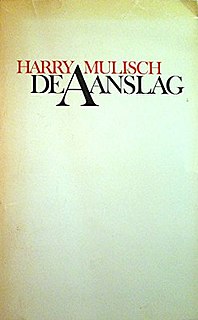 W
WThe Assault is a 1982 novel by Dutch author Harry Mulisch. Random House published an English translation by Claire Nicolas White in 1985. It covers 35 years in the life of the lone survivor of a night in Haarlem during World War II when the Nazi occupation forces, finding a Dutch collaborator murdered, retaliate by killing the family in front of whose home the body was found. According to the New York Times, this novel "made his reputation at home and abroad". It was translated into dozens of languages and immediately adapted into a film of the same name that won the 1986 Academy Award for Best Foreign Language Film.
 W
WBadge of Glory is a nautical historical novel by Douglas Reeman. It forms the initial part of the multi-volume Blackwood saga. which follows the adventures of several generations of Royal Marine officers over 150 years.
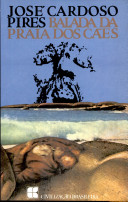 W
WBallad of Dog's Beach is a fiction novel by the Portuguese author José Cardoso Pires, relating the investigation into the murder of a political dissident, taking place around one month later by 1961. The novel is largely based on contemporary reports of a real murder that took place. The real story is the assassination in early 1961 of Army captain Almeida Santos by Jean Jacques, an Army m. d. They were both dissidents of the political regime who escaped from prison with the help of a prison guard. The three men took refuge in a house in Guincho Beach, twenty km outside Lisbon. They were joined by Maria José Maldonado Sequeira, a beautiful young woman who had an affair with A. Santos. While waiting for opportunity to leave the country, Maria José started a love affair with the two men, Santos e Jacques, which caused a fight between them and the death of Santos. Jacques buried him in the beach with the help of the guard. The body was discovered one month later by a dog whose owner was taking a walk.
 W
WBeka Lamb is the debut novel from Belizean writer Zee Edgell, published in 1982 as part of the Heinemann Caribbean Writers Series. It won the Fawcett Society Book Prize in 1982 and was one of the first novels from Belize to gain international recognition.
 W
WBluebeard is a 1982 novel by the Swiss writer Max Frisch. It tells the story of a medical doctor who is accused of murdering his ex-wife. It was Frisch's last novel.
 W
WA Chain of Voices is a 1982 novel by Afrikaans writer André Brink. The novel is a historical novel which recounts the roots of the apartheid system during the early part of the 19th century. The novel focuses on a slave revolt center in the country north-east of Cape Town. The novel uses a coalition of voices, representing the whole range of social groups in South Africa.
 W
WDevil on the Cross is 1980 Gĩkũyũ language novel written and self translated by Kenyan novelist Ngũgĩ wa Thiong'o, which was later republished as part of the influential African Writers Series in 1982. The novel, though dealing with a diverse range of literary conventions and themes, focuses on politically challenging the role of international money and culture in Kenya.
 W
WDragon of the Lost Sea is a fantasy novel by American author Laurence Yep. It was first published in 1982 and is the first book in his Dragon series. Having already written several books, Yep had wanted to adapt Chinese mythology into a fantasy form for some time, and began writing the story in 1980 after undertaking careful research. He had originally intended to adapt a Chinese folktale in which the Monkey King captured a river spirit who had flooded an entire city, which he at first tried to conceive in picture book form.
 W
WDurgaastamana is a 1982 historical novel by well known Kannada novelist and scholar T. R. Subba Rao, or TaRaSu. As the name indicates, the book charts the downfall of the Nayakas of Chitradurga, a dynasty that ruled there for two centuries. The story follows the epic battle between Madakari Nayaka and Hyder Ali of Mysore in 1779, as the latter lays siege to the fort, and the events and political intrigues leading up to it.
 W
WElephant Song is a novel by Barry Longyear published in 1982.
 W
WEye of Cat is a 1982 science fiction novel by American writer Roger Zelazny. It was among his five personal favorite novels from his own oeuvre.
 W
WThe Fragrance of Guava is a book based on the long conversations between Gabriel García Márquez and his close friend Plinio Apuleyo Mendoza. Published in 1982, the book describes the life of García Márquez, from his early childhood to his encounters with celebrities. The title of the book in Spanish is El Olor de la Guayaba. It was translated as The Fragrance of Guava; however, the literal translation should be The Smell of Guava.
 W
WThe Haunting is a low fantasy novel for children written by Margaret Mahy of New Zealand and published in 1982, including a U.K. edition by J. M. Dent. Atheneum published the first U.S. edition in 1983.
 W
WThe House of the Spirits is the debut novel of Isabel Allende. The novel was rejected by several Spanish-language publishers before being published in Buenos Aires in 1982. It became an instant best-seller, was critically acclaimed, and catapulted Allende to literary stardom. The novel was named Best Novel of the Year in Chile in 1982, and Allende received the country's Panorama Literario award. The House of the Spirits has been translated into over 20 languages.
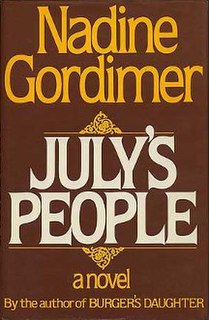 W
WJuly's People is a 1981 novel by the South African writer Nadine Gordimer. It is set in a near future version of South Africa where Apartheid is ended through a civil war. Gordimer wrote the book before the end of apartheid as her prediction of how it would end. The book was notably banned in South Africa after its publication, and later under the post-Apartheid government.
 W
WJuxtaposition is a novel by Piers Anthony published in 1982.
 W
WLapse of Time is a 1982 Chinese novella by Wang Anyi. The novella follows Ouyang Duanli, a strong-minded Shanghai woman who worked hard to support her and her husband's large family during the Cultural Revolution when they were attacked as "former bourgeois".
 W
WLimes inferior is a social science fiction dystopian novel written in 1982 by the Polish author Janusz A. Zajdel. Limes inferior, one of Zajdel's best-known works, is a dystopia showing a grim vision of a future society resulting from a merger of the two systems competing at the time - communism and capitalism. It is a seemingly free society, which is in fact tightly controlled through a system of electronic biometric ID cards (Keys), censored media and other forms of social control.
 W
WKeepers of the House is the debut novel of Lisa St Aubin de Terán, published as The Long Way Home in the US. The novel is autobiographical and set in a Venezuelan valley beset by drought. First published in 1982 by Jonathan Cape it won the Somerset Maugham Award.
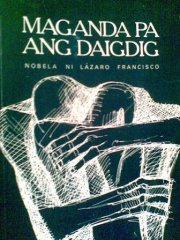 W
WMaganda pa ang Daigdig is a Tagalog-language novel written by Filipino novelist Lázaro Francisco.
 W
WMindkiller is a 1982 science fiction novel by American writer Spider Robinson. The novel, set in the late 1980s, explores the social implications of technologies to manipulate the brain, beginning with wireheading, the use of electric current to stimulate the pleasure center of the brain in order to achieve a narcotic high.
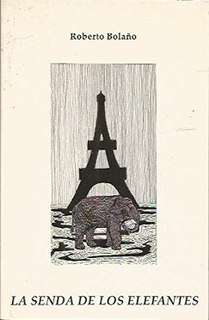 W
WMonsieur Pain is a short novel by Chilean author Roberto Bolaño (1953–2003). Written in 1981-1982, it was originally published in 1994 under the title La senda de los elefantes by the City Council of Toledo, Spain, as the winning story of its "Félix Urabayen Prize". The book was reprinted in 1999 under its final Spanish title, Monsieur Pain. A translation from the Spanish by Chris Andrews was published by New Directions in January 2010.
 W
WObservation on the Spot is a social science fiction novel by Stanisław Lem. The novel is a report of Ijon Tichy's travel to a faraway planet Entia to study their civilization. This report was supposed to fix a misunderstanding arisen from Tichy's Fourteenth Voyage to supposedly Entia, which turned out to be a satellite of Entia, masqueraded by Entians to misguide explorers. The travel was also to verify the results of the "Institute of Historiographical Computers", which use predictive modeling to overcome the speed of light limitation and get information about the state of the affairs on remote planets based on information obtained from previous expeditions.
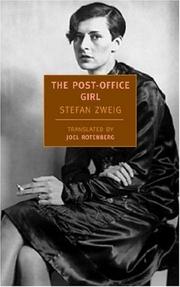 W
WThe Post Office Girl is a novel by the Austrian writer Stefan Zweig. It tells the story of Christine Hoflehner, a female post-office clerk in a small town near Vienna, Austria-Hungary, during the poverty-stricken years following World War I. The book was published posthumously in 1982.
 W
WRakvere romaan is a 1982 historical novel by Estonian writer Jaan Kross.
 W
WO Rapto do Garoto de Ouro is a novel written by Brazilian writer Marcos Rey, originally released in 1982. The story takes place in the neighborhood of Bexiga and chronicles the adventures of a trio consisting of Leo, Gino and Angela, who come to investigate the abduction of their friend Alfredo who had recently become famous thanks to a reality show. With the help of Jaime and a green diary, they go to question on their own a few people who may be responsible for the Golden Boy's abduction.
 W
WRuusulaakso is a novel by Finnish author Kaari Utrio.
 W
WSaigon is a novel by Anthony Grey. Saigon follows the lives of three families, one American, one French, and the other Vietnamese, from the French colonial era in the early 1920s until the last helicopter left Saigon at the end of the Vietnam War.
 W
WA Sinless Season is a novel by South African author Damon Galgut. It was published in 1982 when the author was only seventeen. It details the interactions between Scott, Raoul, and Joseph, three young inmates at the Bleda reformatory.
 W
WStory for a Black Night (ISBN 0618494839) is a 1982 family drama novel by Robert Locke, under the pseudonym Clayton Bess, set in Africa. It won the 2002 Phoenix Award Honor Book award.
 W
WStrange Toys is a fantasy novel written by Patricia Geary and published in 1987. It won the Philip K. Dick Award that year.
 W
WSweet Whispers, Brother Rush is a 1982 children's novel by Virginia Hamilton and is about a girl, Tree, who lives with her mother and older brother, and her involvement with a ghost.
 W
WThe True Deceiver is a novel by Swedish-Finnish author Tove Jansson. It was translated into English by Thomas Teal and won the Best Translated Book Award in 2011.
 W
WVintage Stuff is a novel of British comic writer Tom Sharpe which was written and originally published in 1982. Set in Groxbourne, a parody of Bloxham School where Sharpe received his education, the novel follows the (mis)adventures of Peregrine Clyde-Brown.
 W
WVoyage from Yesteryear is a 1982 science fiction novel by British writer James P. Hogan.
 W
WA Wild Sheep Chase is the third novel by Japanese author Haruki Murakami. First published in Japan in 1982, it was translated into English in 1989. It is an independent sequel to Pinball, 1973, and the third book in the so-called "Trilogy of the Rat". It won the 1982 Noma Literary Newcomer's Prize.
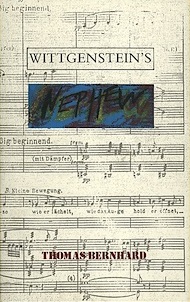 W
WWittgenstein’s Nephew is an autobiographical work by Thomas Bernhard, originally published in 1982. It is a recollection of the author's friendship with Paul Wittgenstein, the nephew of Ludwig Wittgenstein and a member of the wealthy Viennese Wittgenstein family. Paul suffers from an unnamed mental illness for which he is repeatedly hospitalized, paralleling Bernhard's own struggle with a chronic lung disease.
 W
WYoung Shoulders is a 1982 novel by John Wain. It portrays incompatibility in a marital relationship and how such a flawed marriage affects the children born out of it. It won the 1982 Whitbread Prize.